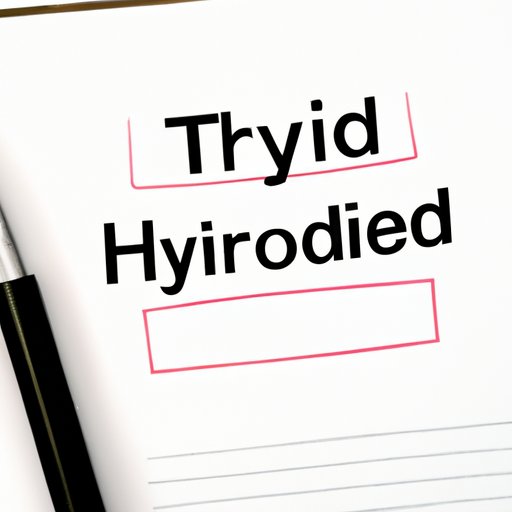
Introduction
Hyperthyroidism is a condition that occurs when the thyroid gland produces too much thyroid hormone. It affects an estimated 1% of the population and can cause a range of symptoms that impact daily life. If you or a loved one has been diagnosed with hyperthyroidism, you may be wondering what your treatment options are. In this article, we will explore a variety of treatment options for hyperthyroidism, including medication, radioactive iodine, surgery, lifestyle changes, complementary and alternative treatments, and tips for managing the condition.
Understanding Hyperthyroidism
Hyperthyroidism is a condition that occurs when the thyroid gland produces too much thyroid hormone. The thyroid gland is a butterfly-shaped gland located in the neck that produces hormones that regulate the body’s metabolism. Causes of hyperthyroidism include autoimmune disease, such as Graves’ disease, thyroiditis, and nodules on the thyroid gland. Symptoms of hyperthyroidism may include weight loss, increased appetite, heart palpitations, anxiety, muscle weakness, and sweating. It is important to seek medical attention if you experience any of these symptoms, as untreated hyperthyroidism can lead to serious health complications, such as heart disease and brittle bones.
Medications for Hyperthyroidism
There are two main types of medications prescribed for hyperthyroidism: beta-blockers and antithyroid medications. Beta-blockers are prescribed to manage symptoms such as heart palpitations, tremors, and anxiety. Antithyroid medications work by reducing the production of thyroid hormone. These medications include methimazole and propylthiouracil (PTU). They may take several weeks to become effective, and it is important to take the medications as prescribed and follow up with regular blood tests to monitor thyroid hormone levels. Potential side effects of medication may include skin rashes, nausea, and liver dysfunction. It is important to discuss any medication concerns with a healthcare provider.
Radioactive Iodine
Radioactive iodine is a treatment option for hyperthyroidism, particularly for Graves’ disease. The patient is given a dose of radioactive iodine orally, which is taken up by the thyroid gland and destroys the cells that produce thyroid hormone. The procedure is painless, but the patient may experience temporary throat swelling or difficulty swallowing. It is important to discuss the treatment with a healthcare provider beforehand, as it should not be used during pregnancy or breastfeeding. It is also important to avoid close contact with others for a short time after the procedure.
Surgery for Hyperthyroidism
Surgery may be necessary in some cases of hyperthyroidism, particularly if there are nodules on the thyroid gland or if medication is not effective in managing symptoms. There are two types of thyroid surgery: a total thyroidectomy, which involves the removal of the entire thyroid gland, and a partial thyroidectomy, which involves the removal of only a part of the gland. After surgery, the patient will need to take synthetic thyroid hormone to regulate the body’s metabolism. Potential risks of surgery include damage to the vocal cords or parathyroid gland. It is important to discuss the risks and benefits of surgery with a healthcare provider before making any decisions.
Lifestyle Changes to Manage Hyperthyroidism
While medication, radioactive iodine, and surgery are effective treatment options for hyperthyroidism, there are also lifestyle changes that can help manage symptoms. Eating a healthy diet that is high in nutrients that support thyroid health, such as iodine, selenium, and zinc, can be beneficial. Exercise can help increase energy and reduce stress. Stress management techniques such as yoga and meditation can also be beneficial. It is important to discuss any lifestyle changes with a healthcare provider.
Complementary and Alternative Treatments
Complementary and alternative treatments, such as acupuncture, herbal remedies, or homeopathy, may be used alongside conventional treatments for hyperthyroidism. While these treatments may be beneficial for some patients, it is important to discuss them with a healthcare provider, as some treatments may interact with medication or have side effects. It is also important to note that these treatments should not be used as a replacement for conventional treatment.
Tips for Managing Hyperthyroidism
Managing hyperthyroidism can be challenging, but there are practical tips that can help. It is important to communicate effectively with healthcare providers and follow medication and treatment plans as prescribed. Managing medication side effects can be done by taking medication with food or adjusting the dose. Self-care is also important and may include getting adequate rest, reducing stress, and seeking support from friends and family. Support groups and online resources are available for those living with hyperthyroidism.
Conclusion
Hyperthyroidism is a condition that affects many people, but there are a variety of treatment options available. Medication, radioactive iodine, surgery, lifestyle changes, and complementary and alternative treatments can all be effective ways to manage hyperthyroidism symptoms. It is important to discuss treatment options with a healthcare provider and to follow medication and treatment plans as prescribed. Self-care and support are also important aspects of managing hyperthyroidism. With proper treatment and management, individuals with hyperthyroidism can lead healthy, happy lives.





